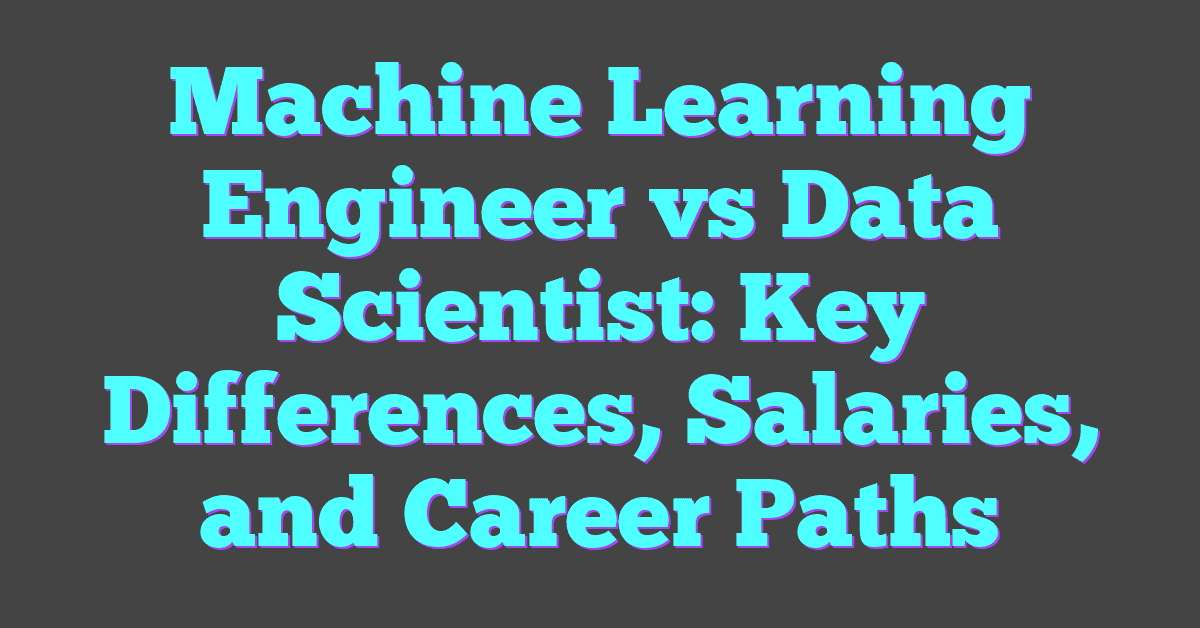In today’s tech-driven world, the roles of machine learning engineers and data scientists often spark curiosity and confusion. Both positions are integral to harnessing the power of data, yet they bring distinct skill sets and responsibilities to the table. Understanding these differences can help businesses make informed hiring decisions and professionals choose the right career path.
Machine learning engineers focus on designing and implementing predictive models and algorithms. They bridge the gap between data science and software engineering, ensuring models are scalable and efficient. On the other hand, data scientists dive deep into data analysis and interpretation, uncovering insights that drive strategic decisions. While their tools and techniques may overlap, their end goals and daily tasks set them apart.
Understanding the Roles
Machine learning engineers and data scientists play pivotal roles in the tech ecosystem. They’re often confused due to overlapping skills but have distinct functions that contribute uniquely to data-driven projects.

Who Is a Machine Learning Engineer?
Machine learning engineers design, build, and deploy predictive models and algorithms. Their primary role is to bridge the gap between data science and software engineering. They transform models created by data scientists into production-level applications. They use programming languages like Python and frameworks like TensorFlow, focusing on optimizing model performance and scalability. Their tasks often include data preprocessing, feature engineering, model validation, and continuous model improvement.
Who Is a Data Scientist?
Data scientists analyze and interpret complex data to provide actionable insights. They focus on collecting, cleaning, and modeling datasets to solve business problems. They use statistical tools and programming languages such as R or Python. Unlike machine learning engineers, data scientists prioritize data exploration and hypothesis testing. They create visualizations to communicate findings effectively. Their responsibilities span from conducting A/B testing and data mining to statistical analysis and predictive modeling.
Key Responsibilities
Machine learning engineers and data scientists play distinct yet complementary roles in the tech industry, each with its specific focus and tasks.
What Does a Machine Learning Engineer Do?
Machine learning engineers specialize in designing, building, and deploying predictive models and algorithms. They typically follow several essential tasks:
- Model Development: Building and training machine learning models using various algorithms and techniques to handle data processing tasks.
- Algorithm Optimization: Refining algorithms to improve model performance and scalability, ensuring they run efficiently on different platforms.
- Software Integration: Integrating machine learning models into existing systems and applications, enabling seamless deployment in a production environment.
- Performance Monitoring: Continuously monitoring model performance and making necessary adjustments to maintain accuracy and efficiency.
- Collaboration: Working closely with data scientists, software developers, and other stakeholders to align the machine learning solutions with business goals.
Machine learning engineers often focus on the practical application of data science principles using robust software engineering practices.
What Does a Data Scientist Do?
Data scientists specialize in extracting insights from complex data sets, focusing on analytical and interpretative tasks:
- Data Collection: Gathering and preparing data from various sources for analysis.
- Data Exploration: Conducting exploratory data analysis (EDA) to understand data distributions, patterns, and anomalies.
- Hypothesis Testing: Formulating and testing hypotheses to uncover hidden trends and relationships within data.
- Predictive Modeling: Creating statistical models to predict future trends and outcomes based on historical data.
- Data Visualization: Presenting data insights through charts, graphs, and dashboards to communicate findings effectively.
- Stakeholder Communication: Collaborating with business leaders and stakeholders to translate data findings into actionable business strategies.
Data scientists often emphasize the interpretative aspects of data analysis, focusing on uncovering insights and patterns that inform decision-making processes.
By understanding these responsibilities, one can better appreciate the unique contributions of machine learning engineers and data scientists in the data-driven landscape.
Skills Required
Both machine learning engineers and data scientists possess distinct skill sets essential for their roles. Understanding these skills is vital for anyone interested in pursuing a career in these domains.
Skills for Machine Learning Engineers
Machine learning engineers need a strong foundation in computer science and mathematics. Proficiency in programming languages, especially Python, C++, Java, and R, is crucial. They must understand algorithms and data structures to design and implement machine learning models effectively.
They also need:
- Mathematics and Statistics: Knowledge in linear algebra, calculus, and probability theory is essential for building and refining machine learning algorithms.
- Software Engineering: Skills in software development, version control (Git), and understanding code architecture are vital for deploying models in real-world applications.
- Model Optimization: Experience in hyperparameter tuning, regularization techniques, and model evaluation metrics helps improve model performance.
- Big Data Technologies: Familiarity with Hadoop, Spark, and other big data frameworks enables handling and processing large datasets efficiently.
- Machine Learning Frameworks: Proficiency with TensorFlow, Keras, PyTorch, or similar tools is necessary for developing and training models.
Skills for Data Scientists
Data scientists focus on extracting insights from data, requiring a diverse set of skills. They must be adept in statistical analysis and data wrangling to clean, process, and interpret data.
Key skills include:
- Statistical Analysis: Proficiency in hypothesis testing, regression analysis, and inferential statistics to make data-driven decisions.
- Data Visualization: Expertise in tools like Matplotlib, Seaborn, and Tableau for creating informative visualizations to communicate findings.
- Programming: Skills in languages such as Python, R, and SQL for data manipulation, analysis, and automation of tasks.
- Domain Knowledge: Understanding the industry context is crucial for deriving meaningful insights and making relevant business recommendations.
- Machine Learning: Familiarity with basic machine learning techniques and frameworks to build predictive models for data analysis tasks.
These skills distinguish the roles of machine learning engineers and data scientists, offering unique contributions to the field of AI and data science.
Industries and Career Paths
Machine learning engineers and data scientists find opportunities across various industries. Their skills drive innovations and solve complex problems in distinct sectors.
Industries Hiring Machine Learning Engineers
Machine learning engineers are in high demand in technology, healthcare, finance, and automotive industries.
- Technology: Tech companies use machine learning to develop products like personal assistants and recommendation systems.
- Healthcare: Hospitals and research institutions leverage machine learning for predictive analytics in patient care and medical imaging.
- Finance: Financial firms apply machine learning to algorithmic trading, fraud detection, and risk management.
- Automotive: Car manufacturers use machine learning for autonomous driving, predictive maintenance, and vehicle design optimization.
Industries Hiring Data Scientists
Data scientists play a crucial role in marketing, retail, media, and logistics industries.
- Marketing: Marketing firms utilize data scientists to perform customer segmentation, sentiment analysis, and predictive modeling.
- Retail: Retailers depend on data scientists for inventory management, personalized recommendations, and sales forecasting.
- Media: Media companies employ data scientists for audience analysis, recommendation algorithms, and content optimization.
- Logistics: Logistics firms use data scientists to optimize supply chain management, route planning, and demand forecasting.
Machine learning engineers and data scientists contribute uniquely to industry advancements with their specialized skills.
Salary Comparison
Salaries for machine learning engineers and data scientists vary based on experience, location, and industry. According to Glassdoor, as of 2023, the average annual salary for a machine learning engineer in the United States is $112,806. For data scientists, the average annual salary stands at $96,492.
Experience Level
Experience significantly affects salaries. Entry-level machine learning engineers earn around $89,000. Mid-level professionals with 3-5 years of experience can expect to earn approximately $112,000 while those with over 10 years can earn more than $150,000. Entry-level data scientists earn about $85,000, mid-level data scientists earn around $100,000, and those with substantial experience can make over $130,000.
Location Impact
Location plays a crucial role in salary differences. In tech hubs like San Francisco and New York, machine learning engineers can earn upwards of $140,000. In these cities, experienced data scientists can also hit the $130,000 mark. Conversely, in smaller cities, salaries might be 10-20% lower for both roles.
Industry Variation
Salary also varies by industry. Technology and finance sectors offer higher compensation for machine learning engineers, often exceeding $125,000. Healthcare and automotive industries provide competitive salaries around $120,000. For data scientists, the highest salaries are in the technology and marketing sectors, reaching up to $115,000. Retail and logistics industries offer competitive rates, usually around $105,000.
| Criteria | Machine Learning Engineer | Data Scientist |
|---|---|---|
| Average Salary | $112,806 | $96,492 |
| Entry-level Salary | $89,000 | $85,000 |
| Mid-level Salary | $112,000 | $100,000 |
| Senior Salary | $150,000+ | $130,000+ |
| High Location Salary | $140,000 | $130,000 |
| Tech Sector Salary | $125,000+ | $115,000 |
Both roles command competitive salaries reflecting their critical roles in advancing technology and data utilization.
Conclusion
Choosing between a career as a machine learning engineer or a data scientist depends on one’s interests and skills. Both roles offer exciting opportunities and competitive salaries. Machine learning engineers thrive in tech and finance sectors, while data scientists find success in technology and marketing. As technology continues to evolve, the demand for these professionals will only grow, making either path a promising choice for those passionate about data and innovation.
Frequently Asked Questions
What is the primary difference between a machine learning engineer and a data scientist?
Machine learning engineers focus on building predictive models using algorithms, while data scientists analyze and interpret complex data to extract insights. Both roles are crucial but involve different skill sets and project goals.
What skills are essential for machine learning engineers?
Machine learning engineers need strong programming skills, proficiency in data modeling, familiarity with algorithms, and experience with machine learning frameworks like TensorFlow or PyTorch.
What skills are important for data scientists?
Data scientists require expertise in statistical analysis, data visualization, programming (often in Python and R), and the ability to interpret and communicate data insights effectively.
What is the average salary for a machine learning engineer in the US?
The average salary for a machine learning engineer in the US is approximately $112,806 per year.
What is the average salary for a data scientist in the US?
Data scientists in the US earn an average salary of around $96,492 per year.
How do salaries vary based on location?
Salaries for both machine learning engineers and data scientists are higher in tech hubs like San Francisco due to the high demand and cost of living. Other regions may offer lower salaries but still remain competitive.
Which industries pay the highest salaries for machine learning engineers?
Machine learning engineers receive top salaries in technology and finance sectors, where advanced predictive models play a significant role in operations and strategy.
Which industries offer the highest salaries for data scientists?
Data scientists find the highest salaries in the technology and marketing sectors, where their ability to uncover insights from complex data is highly valued.
Do experience levels impact salaries for machine learning engineers and data scientists?
Yes, experience significantly impacts salaries. More experienced professionals command higher pay due to their advanced skills and greater contributions to projects.
Are salaries for both roles competitive?
Yes, the salaries for both machine learning engineers and data scientists are competitive, reflecting the high demand for their expertise in advancing technology and data utilization.



